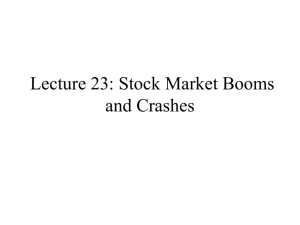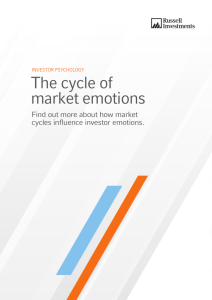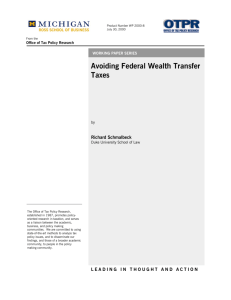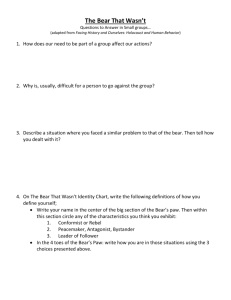lessons of time Learning from the
advertisement
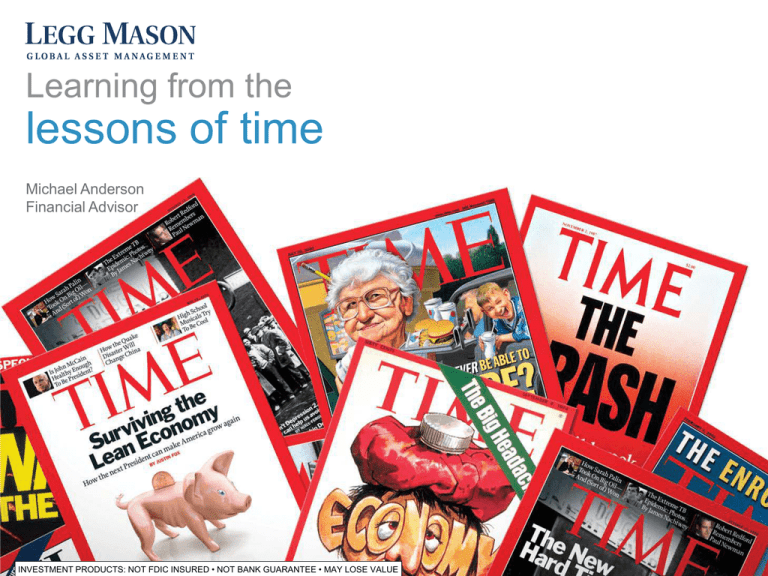
Learning from the lessons of time Michael Anderson Financial Advisor INVESTMENT PRODUCTS: NOT FDIC INSURED • NOT BANK GUARANTEE • MAY LOSE VALUE No matter what the headlines say… The Crash: After a Wild Week on Wall Street, is the World Different? America’s Banks: Awash in Troubles Will You Ever Be Able to Retire? Who’s in Charge? Is the U.S. Going Broke? The Economy: Is There Light at the End of the Tunnel? High-Tech Wall Street — Is it Good for America? Sources: “The Crash: After a Wild Week on Wall Street, is the World Different?” (Time, November 2, 1987), “Will You Ever Be Able to Retire?” (Time, July 29, 2002), “America’s Banks: Awash in Troubles” (Time, December 12, 1984), “Who’s in Charge?” (Time, November 9, 1987), “Is the U.S. Going Broke?” (Time magazine, March 13, 1972), “High-Tech Wall Street — Is it Good for America?” (Time, November 10, 1986), “The Economy: Is there Light at the End of the Tunnel?” (Time, September 28, 1992). The dates may change, but the headlines stay the same... 2009 Today’s economic turmoil may FEEL like something totally new… …yet looking at four decades of TIME covers, it’s clear that “we’ve been here before” 1974 1987 1998 2001 2008 Recession & Market Fears “Can a nation with a trillion dollar economy be running out of money?”* 1972 1974 “The stock market has scarcely been so shaky since 1929. Just about everyone who buys, sells, borrows or invests has that overall feeling of unease.”** *Source: “Empty Pockets on a Trillion Dollars a Year,” Time, March 13, 1972. **Source: “Seeking Relief from a Massive Migraine,” Time, September 9, 1974. 1979 Drastic interest rate hikes from the Fed put the squeeze on credit and the markets, while consumers waited in line for gas. “Bankers now face their most strenuous survival test since the Great Depression”* 1984 1987 “Black Monday’s 22.6% one-day drop in the Dow terrified investors.”** 1990 “Banks and insurance firms are tottering beneath huge portfolios of bad real estate mortgages”*** * “Banking Takes a Beating,” by William Blaylock, Christopher Redman, Adam Zagorin, Stephen Koepp, Time, December 12, 1984. ** Source: FactSet, based on the performance of the Dow Jones Industrial Average on October 19, 1987. The DJIA is a widely followed measurement of the stock market. The average is comprised of 30 stocks that represent leading companies in major industries. These stocks, widely held by both individual and institutional investors, are considered to be all blue-chip companies. *** “All Shook Up,” by John Greenwald, Time, October 15, 1990. “…the job drought, the debt hangover, the defense-industry contraction, the savings and loan collapse, the real estate depression, the health-care cost explosion and runaway federal deficit…”** 1992 1998 Global financial turmoil (and a declining Dow) fuel concerns about the economy *“The Long Haul” by S.C. Gwynne Washington, Time, Sept. 28, 1992. 2001 2008 Financial Security 1993 1977 1982 2002 1995 2008 “All sorts of people who never thought they would be on the jobless lines… are looking for jobs and not finding them”* 1993 1982 2002 “It is doubly troublesome that the ranks of the jobless are growing at a time when many of the cushions softening the pain of unemployment have been deflated”** * “Jobs in the Age of Insecurity,” by George J. Church, Time, Nov. 22, 1993. ** “Unemployment On the Rise,” by James Kelly, Time, Feb. 8, 1982. *** “Everyone, Back in the Labor Pool,” by Daniel Kadlec, Time, July 29, 2002. “Americans are more worried about their financial future than at any other time since the turbulent 70’s”*** Ethics 1976 1987 1986 2003 2008 1986 “The whirlwind of activity seems more like a new variation on Mark Twain’s Gilded Age — a time of reckless speculation and profiteering. Amid the hubbub of buying and selling, a host of probing question are being asked about the stock market and its relationship to U.S. capitalism in general.”* *“Manic Market,” Time, November 10, 1986. **“Enron Spoils the Party,” by Michael Duff and John F. Dickerson, Time, February 4, 2002. 2003 “The implosion of the huge Texas energy firm and sudden loss of retirement funds for thousands of employees and pensioners opened up all the pathways to Scandal-land…”** “Nothing we can do can change the past, but everything we do changes the future” -Ashleigh Brilliant For every bear, there’s a bull… Cumulative total returns of the S&P 500 following the 1973-1974 bear market 300.00% Peak to trough (market high to market low) 1 Year after end 267.23% 250.00% 5 Year after end 200.00% 10 Year after end 150.00% 100.00% 74.66% 50.00% 25.99% 0.00% -50.00% -48.20% -100.00% Source: GPW and Dow Jones & Company, Inc. Past performance is no guarantee of future results. This chart is for illustrative purposes only and is not indicative of performance of any specific investment. Please note that an investor cannot invest directly in an index. This chart illustrates the historical performance of the Standard & Poor’s 500 Index (S&P 500) before and after a bear market bottom (October 3, 1974). Cumulative total returns include reinvestment of dividends and capital gains. For every bear, there’s a bull… Cumulative total returns of the S&P 500 following the 1987 market crash 500.00% Peak to trough (market high to market low) 456.10% 1 Year after end 400.00% 300.00% 5 Year after end 10 Years after end 200.00% 122.09% 100.00% 23.33% 0.00% -33.51% -100.00% Source: GPW and Dow Jones & Company, Inc. Past performance is no guarantee of future results. This chart is for illustrative purposes only and is not indicative of performance of any specific investment. This chart illustrates the historical performance of the Standard & Poor’s 500 Index (S&P 500) before and after a bear market bottom (December 14, 1987). Cumulative total returns include reinvestment of dividends and capital gains. For every bear, there’s a bull… Cumulative total returns of the S&P 500 following the 2000-2002 bear market 150.00% Peak to trough (market high to market low) 105.12% 1 Year After End 100.00% 5 Years After End 50.00% 24.40% 0.00% -50.00% -49.15% -100.00% Source: GPW and Dow Jones & Company, Inc. Past performance is no guarantee of future results. This chart is for illustrative purposes only and is not indicative of performance of any specific investment. This chart illustrates the historical performance of the Standard & Poor’s 500 Index (S&P 500) before and after a bear market bottom (October 9, 2002). Cumulative total returns include reinvestment of dividends and capital gains. Staying in the market: A tale of four investors A $10,000 investment at the peak of the ’87 market…and what happened based on four reactions to the October ’87 crash through the next twenty-two years (year-end 2009) $200,000 $184,816 $160,000 $120,000 $80,000 $57,605 $29,491 $40,000 $7,846 $0 Sold Sold and moved the assets into CDs earning 5% Remained invested Remained invested and continued to invest Source: Thomson InvestmentView. Past performance is no guarantee of future results. This chart is for illustrative purposes only and is not indicative of performance of any specific investment. Please note that the illustration above does not take into account any fees, expenses or taxes. The chart above illustrates a hypothetical investment of $10,000 invested in the Standard & Poor’s 500 Index (S&P500) on September 30, 1987, near the market high, and then the subsequent financial impact of various investment strategies on the same portfolio implemented on October 31, 1987, after the market crash on October 19, 1987 through December 31, 2009. The hypothetical “Remained invested and continued to invest” assumes a monthly investment of $200.00. A CD is a debt instrument issued by a bank that usually pays an interest rate set by competitive forces in the marketplace. CDs are FDIC-insured up to $250,000, offer a fixed rate of return, but may be subject to fluctuating rates and early withdrawal penalties. Staying in the market: It’s time, not timing Market returns: S&P 500 Index from 12/31/89-12/31/09(%) 10 8.21 4.46 5 2.01 0 -0.04 -1.93 -5 -10 -10.36 -15 Fully invested Missed the top 10 days Missed the top 20 days Missed the top 30 days Missed the top 40 days Missed the top 100 days Sources: FactSet as of 12/31/09. Past performance is no guarantee of future results. All investments involve risks, including loss of principal. The chart provided is for illustrative purposes only and represents an unmanaged index in which investors cannot directly invest. Performance shown does not represent the past or future performance of any investment product. Principles that have stood the test of time • • • • • • • Recognize that the issues that worry investors today aren’t new Stay focused on the big picture Don’t let emotions drive your decisions Understand your tolerance for risk Stay invested Be diversified* Work closely with a trusted financial advisor *Diversification does not ensure a profit or protect against a market loss. “The more things change, the more they remain the same” —Jean-Baptiste Alphonse Karr Important information Time magazine cover images used in this presentation include: “Is the U.S. Going Broke?” March 13, 1972 “Economy: The Big Headache” September 9, 1974 “Recession’s Greetings,” December 19, 1974 “The Big Payoff,” February 23, 1976 “Revolt of the Old: The Battle Over Forced Retirement,” October 10, 1977 “The Squeeze of 1979: Tighter Money, Higher Prices, Wall Street Woes,” October 22, 1979 “Unemployment: The Biggest Worry,” February 9, 1982 “America’s Banks – Awash in Troubles,” December 12, 1984 “High Tech Wall Street: Is it Good For America?” November 10, 1986 “Whatever Happened to Ethics,” May 25, 1987 “The Crash,” November 12, 1987 “High Anxiety,” October 15, 1990 “The Economy: Is There Light at the End of the Tunnel?” September 28, 1992 “Whatever Happened to the Great American Job?” November 22, 1993 “The Case for Killing Social Security,” March 20, 1995 “Is the Boom Over?” September 14, 1998 “Looking Beyond the Bear” March 24, 2001 “The Enron Mess: How Sticky Will It Get?” February 4, 2002 “Will You Ever Be Able To Retire?” July 29, 2002 “Surviving the Lean Economy,” May 26, 2008 “How Wall Street Sold Out America,” September 29, 2008 “The New Hard Times,” October 13, 2008 “Why Main Street Hates Wall Street,” November 9, 2009 Reprinted with permission from Time, Inc. All images are copyrighted by Time Inc. All rights reserved. All investments involve risk, including loss of principal amount invested. There is no guarantee that investment objectives will be achieved. Investors should carefully consider their objective, risk tolerance and time horizon before investing. www.leggmason.com/individualinvestors © 2010 Legg Mason Investor Services, LLC, member FINRA, SIPC. Legg Mason Investor Services, LLC is a subsidiary of Legg Mason, Inc. FN1010496 INVESTMENT PRODUCTS: NOT FDIC INSURED• NOT BANK GUARANTEE • MAY LOSE VALUE

